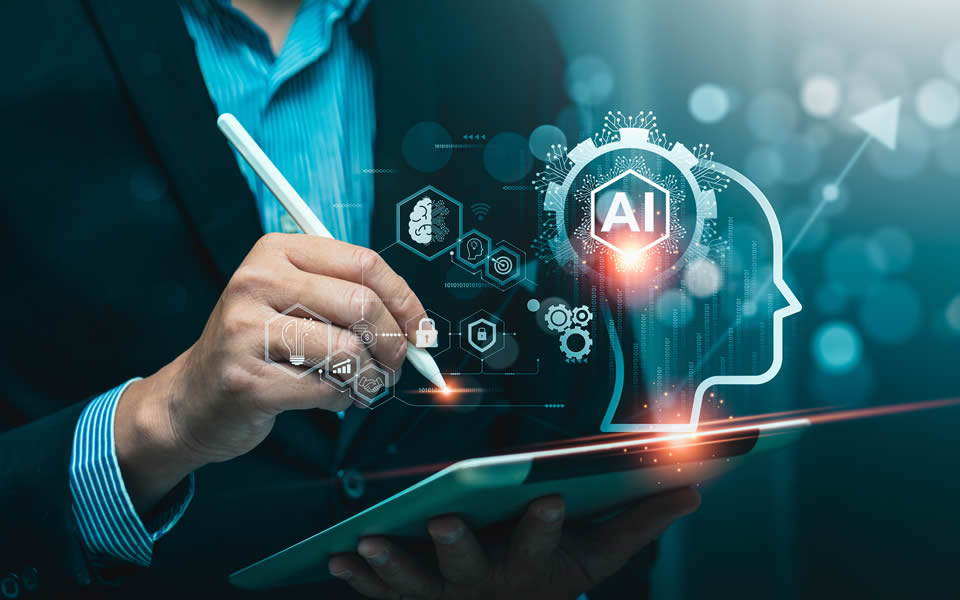Audit Innovations: How Emerging Technology is Transforming the Audit Landscape
By Timm Rufo, Partner, Assurance Services
The auditing field is undergoing a seismic shift thanks to emerging technologies such as artificial intelligence (AI), data analytics, and blockchain. These innovative tools and techniques enhance existing methods and play a crucial role in restructuring the audit landscape. Integrating these cutting-edge technologies is changing the conventional approaches to audit planning, execution, and delivery.
With its adoption of innovative tools, Marcum is setting the new standard for audit processes amid the ever-evolving financial landscape.
The Rise of Artificial Intelligence in Auditing
Artificial Intelligence stands at the forefront of this technological revolution. AI allows auditors to perform more thorough and complex analyses with greater accuracy and efficiency. Machine learning algorithms identify patterns and anomalies in large, complex data sets that might signal errors or fraud.
A recent study by Goldman Sachs underscored the transformative potential of generative AI tools, estimating their potential impact on 300 million full-time jobs worldwide.1 Among these professionals, accountants are particularly exposed to the capabilities of generative artificial intelligence.
The practical applications of AI in auditing are diverse. For instance, Document Understanding enables AI to understand and analyze textual information within documents such as contracts, agreements, and correspondence. This can help auditors quickly extract and verify relevant information, significantly reducing the time required for manual document review.
In December 2023, Marcum launched AskMarcum.ai, a tool powered by Microsoft Azure OpenAI Service to improve productivity and efficiency for its team members.
“Developed by Marcum Technology’s innovation incubator, Marcum Labs, this platform combines a user-friendly interface with the power of AskMarcum.ai and will enhance communication, knowledge sharing, and problem-solving,” said Peter Scavuzzo, Chief Information & Digital Officer and CEO of Marcum Technology. “AI is evolving at an unbelievable pace, and it will ultimately make it easier for business owners to interact with their CPA advisers.”
Data Analytics: The Power of Insight
Over the past years, the implementation of technology-assisted analysis in accounting has experienced significant growth. An increasing number of accounting firms are now integrating these advanced analytical methods into their audit procedures, enhancing the efficiency and accuracy of their auditing practices.
Integrating data analytics in auditing transforms raw data into actionable insights. This may involve supporting risk assessment and planning, journal entry testing, extracting or visualizing data, or performing detailed testing. Auditors can utilize sophisticated analytical tools to perform risk assessment procedures, such as preliminary analytical procedures based on historical data. Such predictions can inform audit scopes and focus areas, enhancing the audit’s effectiveness.
Data analytics can also be crucial in identifying unusual transactions or patterns that may indicate errors or fraud. By deploying advanced statistical methods and modeling techniques, auditors can scrutinize entire datasets rather than relying solely on sample-based auditing. For instance, this may involve identifying patterns and anomalies in financial data for fraud prevention.
Blockchain: A Ledger for Change
Blockchain technology is renowned for its potential to enhance transparency and security in various sectors and could be a game changer for the auditing industry in the coming years. By design, blockchain provides a verifiable and tamper-proof record of transactions. This can have profound implications for auditors, as it can significantly reduce the time spent confirming the validity of transactions and ledgers.
Incorporating blockchain technology into the transactional backbone of shipping, logistics, and finance industries could be a foundational step toward its broader adoption in audit processes. As industries begin to rely on blockchain for real-time transaction recording, the auditing sector can leverage the intrinsic reliability of this technology to enhance their practices.
Auditors are exploring blockchain for real-time auditing and continuous monitoring. Once the audit industry fully embraces blockchain, the ‘audit trail’ concept may take on a new meaning as each transaction is immutably recorded, providing a clear and accessible audit history.
Cybersecurity and Audit: A Symbiotic Relationship
As technology becomes increasingly intertwined in the auditing process, the significance of cybersecurity cannot be overstated. Auditors must ensure the integrity and security of the data they use. This means not only protecting their systems but also understanding the cybersecurity measures in place at the organizations they audit.
Cybersecurity concerns have led to the emergence of IT audits as an integral part of the overall audit process. IT auditors specialize in understanding and evaluating the controls around information systems, ensuring that data is secure and reliable.
Embracing Challenges, Envisioning the Future
Auditors face several challenges when adopting new technologies. They must be trained to use new tools, ensure data privacy and security, and follow a regulatory framework. Auditing is an art as much as a science, relying on professional judgment and skepticism. Technology can enhance these human qualities but not replace them. So, auditors must balance technology use with critical thinking skills.
Also, the regulators acknowledge the increasing adoption of technology-assisted analysis in audit procedures and that existing standards lack detailed guidance on the design and execution of audit procedures that incorporate such analysis. These gaps are expected to be addressed in future standards to ensure the technology’s full potential is harnessed effectively and aligned with established standards for audit completeness and accuracy.
The audit profession is at an inflection point where emerging technologies are not just an option but a necessity to keep up with the pace of change in the business world. The technologies discussed are more than just buzzwords; they are integral components of the modern audit process that promise to enhance audit quality, efficiency, and value. As the technology continues to evolve, so will the capabilities and expectations of both auditors and the stakeholders they serve, ultimately transforming the audit landscape into a more dynamic, insightful, and reliable pillar of the financial world.
Source
- https://www.goldmansachs.com/intelligence/pages/generative-ai-could-raise-global-gdp-by-7-percent.html






